-
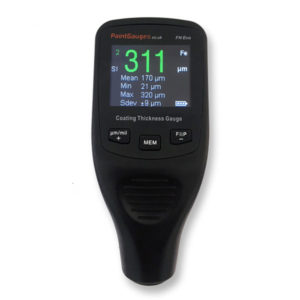
FN Evo Coating Thickness Gauge
£199.99- Max/Min/Avg Stats
- Bright LED display
- 99 place memory
-
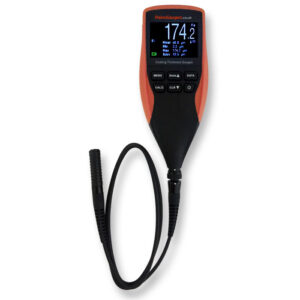
FN Ext Coating Thickness Gauge
£299.99- Highest accuracy
- Statistics and memory
- Cabled probe
-
Sale!

FN Z Coating Thickness Gauge
£159.99- 0-1,500µm range
- Measures paint thickness
- Detects zinc coating
-
Sale!

FN Pro Coating Thickness Gauge
£159.99- 10 place memory
- Display flip
- Fe and NFe
-
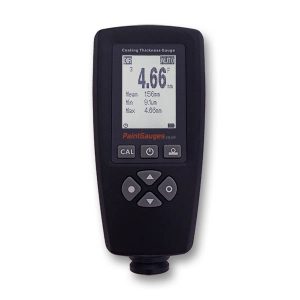
FN Max Coating Thickness Gauge
£329.99- To 5mm thickness
- Statistics and memory
- PC USB download
-
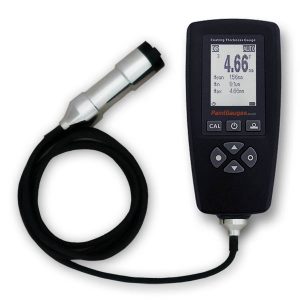
FN Max Ext Coating Thickness Gauge
£379.99- To 5mm thickness
- Statistics and memory
- Cabled probe
-
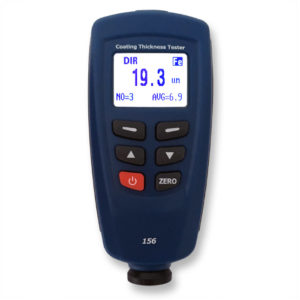
156 USB Coating Thickness Gauge
£289.99- 400 place memory
- Max/Min/Avg/Sdev Stats
- PC USB Download
-
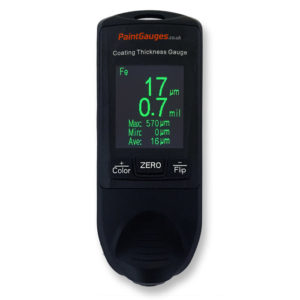
FN Plus Coating Thickness Gauge
£189.99- Max/Min/Avg Stats
- Bright LED display
- Metric and Imperial units
Measure thickness of paint and other coatings
Our coating thickness gauges (often referred to as paint thickness gauges) take readings on virtually all metal substrates. While paint thickness is a common measurement, they also measure thicknesses of many other coatings (such as powder coat, plastic, rubber, vinyl wrap, enamel, galvanising, chroming, and anodising).
Quick, easy, accurate measurements
Our coating thickness gauges are quick and easy to use. Simply hold the sensor against the surface to be measured and the coating thickness is automatically displayed on the gauge’s digital screen.
Feature packed
Ou model range has various feature options. Our FN Evo, FN Ext and FN Max models include a memory function that automatically stores measurements for later recall. Some models also automatically calculate statistics (average, minimum, maximum, standard deviation) to reduce operator workload and speed the inspection process. Our 156 USB model includes a USB port and software to allow download of measurements to a PC.
Models to suit varying needs
From our original FN Pro (our lowest priced model without backlit screen or statistics calculations), to our FN Evo (with colour screen, statistics calculations, and memory), to our flagship FN Ext (our highest accuracy model with enhanced resolution, statistics calculations, cabled probe, and 50 place memory), we have models to suit varying needs and budgets.
Our FN Max coating thickness gauge is able to read thick coatings up to 5mm (5,000µm) in depth. This makes it well suited to use when measuring intumescent paint thickness.
Irrespective of price, all of our coating thickness gauge models are to ISO 2178 and ISO 2360 specifications.
Dual probe technology measures coatings on both ferrous and non-ferrous metals
Unlike lower specification devices, our gauges have the ability to measure coating thicknesses on ferromagnetic (e.g. steel) and non-ferromagnetic (e.g. aluminium) metal substrates via integrated dual sensors, which increases compactness. They automatically detect the substrate metal type and use the appropriate measuring technology (magnetic induction or eddy current) to calculate the coating thickness. This reduces user burden, speeds the inspection process, and increases efficiency. Inferior gauges are limited to measuring on either ferromagnetic or non-ferromagnetic substrates, or require manual removal and switching of sensor type, and selection by the user.
Magnetic Induction
Measures thickness of non-magnetic coatings (e.g. paint, plastic, enamel, rubber, powder coating, zinc chromium, copper, tin) on ferromagnetic metal substrates (e.g. iron, steel). Examples: Paint on a steel car body (most cars). Intumescent paint on steel construction beams, Powder coating on steel railings, Vinyl wrap and paint thickness on a car body, Galvanising on steel sheet.
Eddy Current
Measures thickness of electrically non-conductive coatings (e.g. paint, plastic, enamel, rubber, powder coating, anodising) on non-ferrous metal substrates (e.g. aluminium, brass, zinc). Examples: Paint on an aluminium car body (e.g. Ferrari 360, Jaguar XK8, Audi A8). Powder coating on alloy wheels, Vinyl wrap and paint thickness on a car body, Anodising on aluminium window frames.
Integrated or cabled probe
We have coating thickness gauge models with integrated probes and cabled probes.
A gauge with an integrated probe, such as our FN Evo model, has the probe and sensor built into the body of the gauge. This makes it compact and suitable for single handed use. The risk of damage to a cable is also obviated.
A gauge with a cabled probe, such as our FN Ext model, has the probe and sensor on a cable that is attached to the gauge body. This requires two handed use, one to hold the gauge body and the other to hold and place the probe. However, it can facilitate reaching into confined spaces where the body of the gauge could not. It also allows the display of the gauge to remain in sight of the user at all times, while the probe itself is moved around.
Broad range of use
Our coating thickness gauges are high specification, professional grade measuring instruments suitable for commercial and consumer use. They follow international standards ISO 2178 and ISO 2360 for coating thickness measurement. They are suitable for a variety of end uses in a range of settings, including the following:
- Painters
- Powder coaters
- Fabricators
- Engineering companies
- Aerospace and shipbuilding companies
- Quality inspectors
- Automotive manufacturers
- Car dealers and inspectors
- Bodyshops
- Coating inspectors
- Car detailers
- Used car buyers
- …and other situations where accurate measurement of coating thicknesses on metal substrates is required
